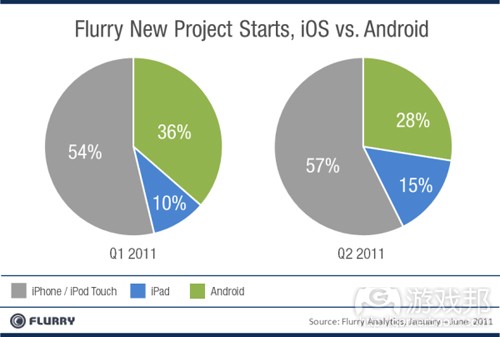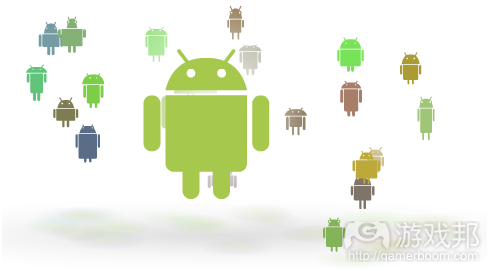每日观察:关注iOS和Android应用开发者支持率调查(7.15)
1)移动分析公司Flurry最新调查数据显示,今年第二季度Android在应用开发者中的支持率低于iOS(游戏邦注:该数据取自采用Flurry分析工具的4.5万家公司的9万款应用的追踪调查结果,并不反映所有应用情况)。
尽管Android和iOS两个平台的应用开发新项目总数,已众第一季度的的9100个增长至第二季度的的1.02万个,但Andorid应用开发新项目在同一时期的数量已从原来的36%下滑至28%,iOS第二季度的的支持率则上升至72%。而在过去的2010年中,Android开发者支持率总体上呈稳定攀升状态,并于第四季度达到39%的顶峰状态。
Flurry指出iOS支持率高于Android有两大原因:一是iPhone与威瑞森合作,扩大了用户的选择权,使iPhone争取到了更多用户;二是苹果发布iPad 2,苹果iPad在不到一年时间中就收获了2000多万的平板电脑安装基数,甚至出现了供不应求的情况,这一现象促使更多开发者针对iPad而非Android平板电脑开发应用。
2)谷歌在第二季度财报电话会议中宣布,采用Android操作系统的移动设备目前已达1.3亿部,Android Market应用下载安装量达到60亿次(游戏邦注:谷歌曾在今年的I/O大会上宣布Android移动设备数量达1亿部,而苹果则在今年的WWDC大会上宣布其移动设备数量达2亿部)。
Android移动设备现在每日激活量为55万次(半个月前谷歌移动副总裁Andy Rubin所宣布激活量达50万次),每周增幅达4.4%。
3)LG最近调查了2000名英国用户并发现64%的受访者承认他们曾在办公室偷偷玩弄智能手机,每十个人中就有一者在开会时有此举动,厕所是他们逃离会议的第一大场所。调查还指出,约五分之一者的这一小动作曾被“当场抓获”并受到斥责。
4)Facebook游戏搜索工具Applifier日前推出手机版搜索工具条,通过推荐服务支持手机用户方便快捷地找到自己感兴趣的游戏(如下图界面底部的游戏推荐),同时也解决开发商面临的产品曝光度不足的问题(游戏邦注:据称在苹果App Store中,游戏获得曝光度的理想途径是获得苹果推荐,另一条路就是跻身前25名游戏榜单)。
Applifier于2010年4月在Fabook平台以工具条形式发布,帮助其合作伙伴推广游戏。假如用户点击该工具条,就可以立即开始体验其推荐的游戏。目前Applifier游戏推广网络已覆盖1.5亿以上的MAU和800多款游戏,其交叉推广服务已促成1亿多次游戏安装量。
Applifier工具条的手机版本首先在iPhone、iPad和iPod平台发布,并将于第三季度登陆Android平台。该交叉推广工具条并不采用奖励刺激下载方案(即以奖励诱使用户下载相关应用的行为)。
5)微软Windows Phone总裁Andy Lees最近表示,他们将平板电脑视为一种PC,并称公司目前不考虑推出基于Windows Phone操作系统的平板电脑。观察者称微软的“平板电脑中的PC”这种思维是其无法追赶苹果在平板电脑市场成就的一个重要原因。
6)新加坡应用服务网站MobileApps.com于近日正式上线,以应用推广、搜索和发行网络形式为终端用户、开发者和发行商提供服务。该平台目前向用户提供了50万款iOS、Android、黑莓、Windows Mobile等平台的应用产品,而开发者则可在“数秒”内将其他应用商店的产品发布到MobileApps.com,如果是非苹果应用则可保留95%的收益(其余为MobileApps.com抽成费用)。
该平台针对发行商的特殊服务是“智能小部件”,支持发行商将这些小部件植入自己的页面,并根据不同地区、关键字和分类进行自定义设置。
MobileApps.com与Adwords/Adsense的相同点在于,它将根据自助服务工具对广告展位进行竞价收费,与谷歌一样也向广告主(游戏邦注:包括开发者、品牌应用持有者)征收38%费用。主要竞争对手是位于美国的AppTap。
7)日本社交平台GREE日前宣布将与其收购的OpenFeint于今年夏天推出第一批在美国发布的游戏。GREE营销副总裁Sho Masuda表示,尽管公司并不缺乏手机游戏开发经验,但美国手机游戏用户与日本玩家在喜好等方面毕竟存在差别,所以他们在美国一切都得从头开始,甚至是招聘这一环节都不例外。
他们将向苹果App Store和Android Market推出免费游戏,这些游戏将通过微交易或广告赞助模式盈利。(本文为游戏邦/gamerboom.com编译,如需转载请联系:游戏邦)
1)iPad 2 and Verizon iPhone Take Some Wind Out of Android’s Sail
by Charles Newark
At Flurry, we regularly track developer support across the various platforms that compete for their allegiance. When companies create new projects in Flurry Analytics, they download platform-specific SDKs for their apps. Since resources are limited, the choices developers make in building for different platforms strongly signal their confidence in those platforms.
They are literally investing their R&D budgets in the hopes of generating future revenue. In total, over 45,000 companies use Flurry Analytics across more than 90,000 applications. For this report, we compare Q1 to Q2 new project starts.
Studying the numbers, it’s readily apparent that Android has lost developer support to iOS. Specifically, Android new project starts have dropped from 36% in Q1 to 28% in Q2. Overall, total Flurry iOS and Android new project starts grew from 9,100 in Q1 to 10,200 in Q2. Of note, this drop in Android developer support represents the second quarter-over-quarter slide, which follows a year of significant, steady growth for the Google-built OS. Over the course of 2010, Android developer support had steadily climbed each quarter, peaking at 39% in Q4 2010.
Considering the events that could have precipitated this shift in developer support, Flurry has identified two probable causes:
1. iPhone Launch on Verizon: With iPhone’s arrival on Verizon in February 2011, three and half years after launching on AT&T, Apple closed the most significant vulnerability gap in its U.S. distribution, and likely worldwide. In fact, with its lengthy exclusive distribution agreement of iPhone on AT&T, it could be argued that Apple itself gave Android the opportunity to reach critical mass on other carriers, most notably Verizon. In that time, Google, Verizon and a host of OEMs worked hard and fast to push Android devices as an alternative to AT&T’s iPhone juggernaut. With Verizon’s launch of the iPhone, the pendulum appears to have swung back in favor of iPhone over Android development.
2. iPad 2 Launch: Establishing an installed base of more than 20 million tablet devices in less than one year, the iPad success story has been compared to taking a buzz-saw to the PC industry. Apple’s iPad shipments, from its last disclosed quarter, were higher than the initial first two quarters of iPad availability. Apple has additionally claimed that it is seeing the “mother of all backlogs.” Building efforts lag behind consumer demand for the device. We believe that wholesale consumer acceptance and adoption of tablets, which just a year ago was questionable within the industry, is further luring developers to build for iPad instead of Android.(source:flurry)
2)Google Android Now On 130M Total Devices, With 6B App Downloads
Alexia Tsotsis
Today during Google’s Second Quarter earnings call a lot of focus was put on the success of Google Android, which was put in Larry Page’s successful consumer products category.
How successful is Android exactly? Well the operating system is now on 130 million total devices, with six billion app installs from the Android Market. The last time Google announced device stats for Android it was 100 million at i/o. Apple was at 200 million devices as of WWDC.
Android is now seeing 550K activations a day, up from the 500K number Google mobile VP Andy Rubin announced 16 days ago, growing at 4.4% week over week according to Rubin.(source:techcrunch)
3)Brits spend 34 days a year fiddling with smartphones at work
by Tim Green
What a waste. Unless you work for a mobile news site, and are paid to do it.
LG surveyed 2000 people to mark the launch of its Optimus 3D phone, and found that 64 per cent of Brits admit to secretly playing with their smartphones in the office.
Apparently one in ten do it during meetings, and the toilet is the top place to disappear for a session. Unsurprisingly porn and adulterous flirting score highly in terms of nefarious fiddling.
The study also found that one in five have been caught and reprimanded.
LG’s press release implies that this is all a very bad thing, but it also points out how much richer the forbidden action can be with the addition of glasses-free 3D.
In fact, it’s launching a ‘Playing by Yourself Just Got Better’ campaign.(source:mobile-ent)
4)Applifier launches mobile game-discovery service
Dean Takahashi
Applifier, which helps games get discovered on Facebook, has launched a new mobile discovery bar to make it easier for social games to spread on mobile devices. The bar is part of a cross-promotion network.
Applifier launched in April, 2010 on Facebook in the form of a bar (pictured above) that advertised a bunch of games from Applifiers partners. If a user clicked on the bar, he or she could start playing that game right away. Now there are more than 150 million monthly active users and 800 games in the Applifier network. The cross promotions have driven more than 100 million game installations. Applifier originally referred to its partners as the “rebel alliance,” after the good guys in the Star Wars movies, who were competing against the dominant social game company Zynga, which can easily cross-promote its own games on its Zynga bar.
Laakkonen said the free Applifier bar has helped hundreds of Facebook publishers grow faster, since they don’t have to spend their profits on as much pure promotion.
But what works on Facebook won’t necessarily work on mobile, according to Laakkonen and other speakers on the Mobile Game Discovery panel at our GamesBeat 2011 conference earlier this week. As you can see from the images, there is a lot more room to promote games on Facebook than there is in a mobile game.
Still, Laakkonen hopes that similar tactics will work on mobile. Applifier is today launching on iPhone, iPad, and iPod. Support for Android devices will begin in the third quarter.
Typically, the main way games get noticed on Apple’s App Store is when Apple features a game in its prime spotlight. Another way is to make it to the top 25 lists.
The cross-promotion bar is non-incentivized. That is, it doesn’t offer the user an incentive, or bribe, to install the advertised app. That will keep Applifier in good graces with Apple, which recently banned pay-per-install incentivized apps. The promotion is effective because it reaches people who are already interested in playing new games.(source:venturebeat)
5)Windows Phone president: “We view a tablet as a PC”
Andy Lees
Microsoft has tried and failed in the tablet marketplace, often using the “PC in a tablet” method. Apple’s iPad revolutionized the market, creating an easy-to-use device that prompted others to play catch-up. As a result, 99 percent of tablets in use now are non-Windows models.
Microsoft’s Andy Lees seems to have come up with his own seven dirty words: “We view a tablet as a PC.”
Sure, it’s not like George Carlin’s famous comedy bit, but the Windows Phone President essentially killed any hope for a tablet based on the Windows Phone OS during a speech yesterday at the Worldwide Partners Conference in Los Angeles.
Device manufacturers that may otherwise be interested in building an easy-to-use Windows tablet (see: HP) have migrated to the Android or WebOS platforms. Bringing them back around to Windows could be difficult.(source:techflash)
6)MobileApps.com Wants To Be The Adsense For Mobile Apps
Serkan Toto
Many mobile app developers share a significant problem: getting their products discovered among the hundreds of thousands of apps i.e. the App Store or the Android Market currently boast.
According to a recent report by Nielsen, just 58% of smartphone users actually use the stores on their handsets to search for new apps.
Enter MobileApps.com, which officially launched today and describes itself as an advertising, discovery and distribution network with three distinct value propositions for end users, developers, and publishers.
For end users, the MobileApps.com serves as a destination that currently lists 500,000 apps (around 2,000 are hosted on the site) for iOS, Android, Blackberry, Windows Mobile and other platform in a collected setting (this so-called marketplace works much like GetJar and similar sites).
With every download, developers are pocketing 95% of the price in the case of non-Apple apps (MobileApps.com takes the rest). Developers can import their own apps from other stores to claim and publish them on the site “in 60 seconds”.
Probably the most interesting element of MobileApps.com is that it’s an advertising network for mobile apps: the site is offering “smart widgets” that showcase specific apps to publishers: website owners, for example, can incorporate those widgets into their pages and customize them (based on different countries, keywords, categories etc.).
The idea here is that these “mini app stores” are targeted to people visiting these websites, making the apps on offer more relevant (and less intrusive) to users – apart from boosting sales. That way a travel site, for example, would offer just travel-related apps within the widget.
Much like Adwords/Adsense, the position on the widget is determined on a bidding basis through a self-service tool. And just as Google, MobileApps.com gets 38% of the amount the advertisers (developers, branded app owners) pay for the position (click here for more information on how the advertising system works).
MobileApps.com is incorporated in Singapore and just received US$400,000 in funding from Tokyo-based mobile company I-FREEK [JP]. The company’s main competitor is US-based AppTap.(source:techcrunch)
7)Japan’s Gree, OpenFeint invade U.S. mobile game shores this summer
by Joe Osborne
Zynga, EA (and PopCap), Rovio: Prepare your defenses. One of Japan’s leading mobile social game networks, Gree, plans to storm the beaches of the U.S. mobile gaming scene this summer, TMCnet reports. The Japanese company, which recently bought San Francisco-based mobile game network provider OpenFeint plans to release the first of its games on U.S. shores this summer. However, it’s not as easy as you might think.
“We’re starting everything from scratch in this market, even hiring,” Gree VP of marketing and sales Sho Masuda told TMCnet. This is because regardless of Gree’s experience with mobile games or the skill of its developers, there are inherent differences in the preferences of Japanese mobile gamers and those in the states, according to Masuda.
The VP added that Gree games will be made available for free on the Apple App Store and Android Marketplace, but will be supported through micro-transactions, which Masuda claims 15 to 20 percent of mobile gamers partake in. (Yeah, maybe in Japan.) (source:games)












































 闽公网安备35020302001549号
闽公网安备35020302001549号